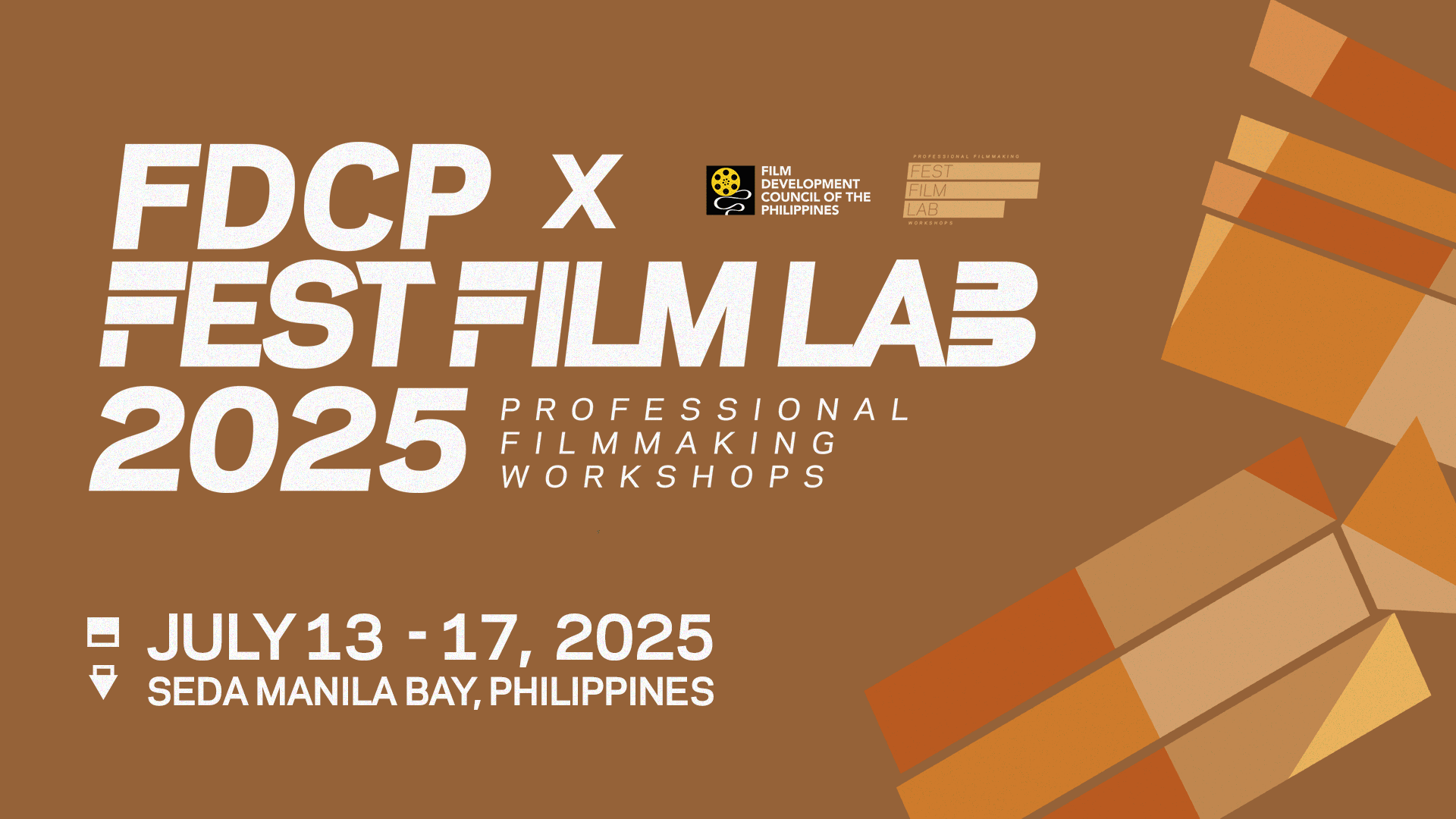Conversations with FDCP Chair Liza Diño and PH Ambassador to Portugal Cookie Feria
The Opening Night of the first Philippine Cinema Retrospective in Portugal was a roaring success. The sold-out screening of Raya Martin's “Independencia,” which was shown in its original 35mm format, kicked off Day 1 of SINE, Cinema das Filipinas – Nos Cem Anos do Cinema Filipino (Philippine Cinema – In the Hundred Years of Filipino Cinema). The jam-packed event held on November 8 was graced by National Artist for Film Kidlat Tahimik, Film Development Council of the Philippines (FDCP) Chairperson and CEO Liza Diño, and Ambassadors from various Embassies such as Iran, Iraq, Indonesia, and Slovak Republic. Some notable names in the Portuguese film industry like Cinemateca Portuguesa Director José Manuel Costa, Portugese cineastes, and the Filipino community in Lisbon also showed their heartwarming support for the event.
A photo op at Cinemateca Portuguesa in Lisbon with FDCP Chair Liza Diño, Philippine Ambassador to Portugal Cookie Feria, National Artist for Film Kidlat Tahimik, and Cinemateca Portuguesa Director José Manuel Costa
Before the screening of opening film “Independencia” (2009), guests were treated to a Filipino cuisine cocktail reception with adobo and laing rice bowls, lumpiang gulay, ginataang bilo-bilo, maja blanca, and kutsinta. The best of Filipino culture was truly showcased that night—from the food, to the music, and cinema. SINE, Cinema das Filipinas was organized by the Philippine Embassy in Portugal, headed by Ambassador Celia Anna “Cookie” Feria, in partnership with Cinemateca Portuguesa and supported by FDCP. The PH Cinema Retrospective was also held to join the year-long celebration of the Philippine Cinema Centennial.
The Filipino cuisine cocktail reception at SINE, Cinema das Filipinas
A total of 15 films from three Golden Ages of Philippine Cinema are scheduled for screenings until November 30 at Cinemateca Portuguesa - Museu do Cinema in Lisbon. Among the selected films are guest of honor Kidlat Tahimik’s “Mababangong Bangungot” (1977) and “Balikbayan #1: Memories of Overdevelopment Redux VI” (1979/2017). A Philippine Cinema Conference was held on November 12 with guest speakers Kidlat Tahimik and University of the Philippines Film Institute Director Patrick Campos. Kidlat Tahimik will also give a lecture on November 27.
National Artist for Film Kidlat Tahimik is the guest of honor of SINE, Cinema das Filipinas.
Ambassador Feria pioneered SINE, Cinema das Filipinas as she has been a long-time active supporter of Philippine Cinema. The inaugural Filipino film festival in Portugal was made possible through the efforts of the Philippine Embassy in Portugal and FDCP's Philippine Embassy Assistance Program (PEAP), which encourages all Embassies and Consulates to promote the Philippine cinematic heritage, not just to the Filipino diaspora, but also to foreign audiences so that they may better understand the country, its arts, and stories.
Cinemateca Portuguesa Director Costa, Ambassador Feria, and FDCP Chair Diño
In this first-ever Conversations with FDCP Chair Liza Diño feature, the FDCP Chairperson and CEO chats with Ambassador Cookie Feria in Lisbon. Diño refers to Feria as a “diplomat rockstar” for championing the Filipino filmmaking artistry in Portugal.
FDCP Chair Diño: Amba. Cookie, congratulations on this initiative! Thank you for inviting me here to be part of this momentous event. How does it feel to promote our country through cinema?
Ambassador Feria: It is all about raising awareness about the Philippines and the Filipino through the medium of film. I wanted to show the Portuguese public the sophistication and artistry of the Filipino when he or she embraces his or her craft as an artist. This is a side that is not evident in day-to-day life. But I think that each one of us has that latent gene in our DNA. We are all artists in our own right.
These men and women behind the films that we are showing during the festival period represent the Filipino as an Artist—the artist who exemplifies the Filipino at his or her best, the Filipino who strives for excellence and is deeply committed to his or her craft. These films are an expression of our creativity, imagination, ideas, and passion for the art of filmmaking. It just makes me proud to be a part of this narrative about the Filipino.
The well-attended screening of opening film “Independencia”
FDCP Chair Diño: How was the response when you pushed for this initiative?
Ambassador Feria: It was all positive! From DFA, to FDCP, and especially the Cinemateca Portuguesa. It is a great honor and privilege to have the name Filipinas hanging from the façade of the Cinemateca Portuguesa, which I see every day from my third floor window across the street. For the next three weeks, every Filipino who comes to the Embassy will see the name FILIPINAS plastered on that beautiful façade across the street!
Funding is a very important aspect of all our cultural initiatives. We in the Foreign Service are truly grateful to the many patrons of the art in government. I’d like to highlight the important legacy that this financial support creates in places like Portugal, for instance. Former Senator and now Deputy Speaker Loren Legarda has always been generous when it comes to promoting and supporting Philippine Arts in various forms. I also wish to thank my entire team at the Philippine Embassy in Lisbon for putting up with my ideas and just standing behind me 1000 percent in all our cultural activities.
FDCP Chair Diño and Ambassador Feria read the programme of SINE, Cinema das Filipinas at Cinemateca Portuguesa, where a photo from “Above the Clouds” is displayed.
FDCP Chair Diño: Which are your favorite films from the lineup of SINE, Cinema das Filipinas? Why?
Ambassador Feria: Favorites, I have many! But one that is special because of the circumstances I find myself in now is "Mababangong Bangungot." I first saw that film in 1981 in San Francisco while I was still a university student. An American classmate invited me on a date to an experimental theatre where "Mababangong Bangungot" was showing. That was 38 years ago! Now, I am the Philippine Ambassador in Lisbon and Kidlat Tahimik is National Artist for Film! And he is in front of me, talking to me! How cool is that?! I have come full circle with "Mababangong Bangungot."
Cinemateca Portuguesa Director Costa, Ambassador Feria, FDCP Chair Diño, and National Artist for Film Kidlat Tahimik
FDCP Chair Diño: Is there anything else that you would like to share about SINE, Cinema das Filipinas?
Ambassador Feria: I also want to make special mention of the people behind the scenes in the Embassy. My Deputy and Consul General is Bing Gallaga, son of the iconic filmmaker and fellow Negrense, Peque Gallaga. Bing guided me with the project from beginning to end by making sure we knew what we were proposing to the Cinemateca. His pedigree in film was very assuring to me and to our partners at the Cinemateca. Thanks, ConGen Bing! And of course, my staff who carried the ball for us, Michelle Reyes and Luisa Lucas. They are the diesel engine that ran this film festival for us.
Ambassador Feria and FDCP Chair Diño together with attendees of the SINE, Cinema das Filipinas Opening Night
FDCP Chair Diño: Thank you, Ambassador Cookie Feria, for championing Philippine Cinema in Lisbon. You are one of the most refreshing and most awesome Philippine ambassadors I've ever met. Thank you for giving our film industry its due importance and for promoting the Filipino artistry and excellence in Lisbon. Cheers to more collaborations! You totally rock! Till our next one!
Cinemateca Portuguesa Director Costa, Ambassador Feria, and FDCP Chair Diño together with Filipino and Portugese moviegoers at the SINE, Cinema das Filipinas Opening Night
Aside from “Independencia,” “Mababangong Bangungot,” and “Balikbayan #1: Memories of Overdevelopment Redux VI,” the other films featured in SINE, Cinema das Filipinas are the 1950 production “Genghis Khan” by Lou Salvador (signed by Manuel Conde), “Noli Me Tangere” (1961) by Gerardo de Leon, “Maynila sa mga Kuko ng Liwanag” (1975) by Lino Brocka, “Ganito Kami Noon… Paano Kayo Ngayon?” (1976) by Eddie Romero, “Insiang” (1976) by Lino Brocka, “Himala” (1982) by Ishmael Bernal, “Oro, Plata, Mata” (1982) by Peque Gallaga, “Karnal” (1983) by Marilou Diaz-Abaya, “Ebolusyon ng Isang Pamilyang Pilipino” (2004) by Lav Diaz, “Serbis” (2008) Brillante Mendoza, “Above the Clouds” (2014) by Pepe Diokno, and “Mariquina” (2014) by Milo Sogueco. These have been shown at Sala Félix Ribeiro or Sala Luís de Pina in Cinemateca Portuguesa located at Rua Barata Salgueiro 39 - 1269-059 Lisbon.





